A NEW Covid strain fuelling the second wave in South Africa has been confirmed in the UK.
Two Britons have tested positive for the “highly concerning coronavirus mutation”, the Health Secretary Matt Hancock announced this afternoon.
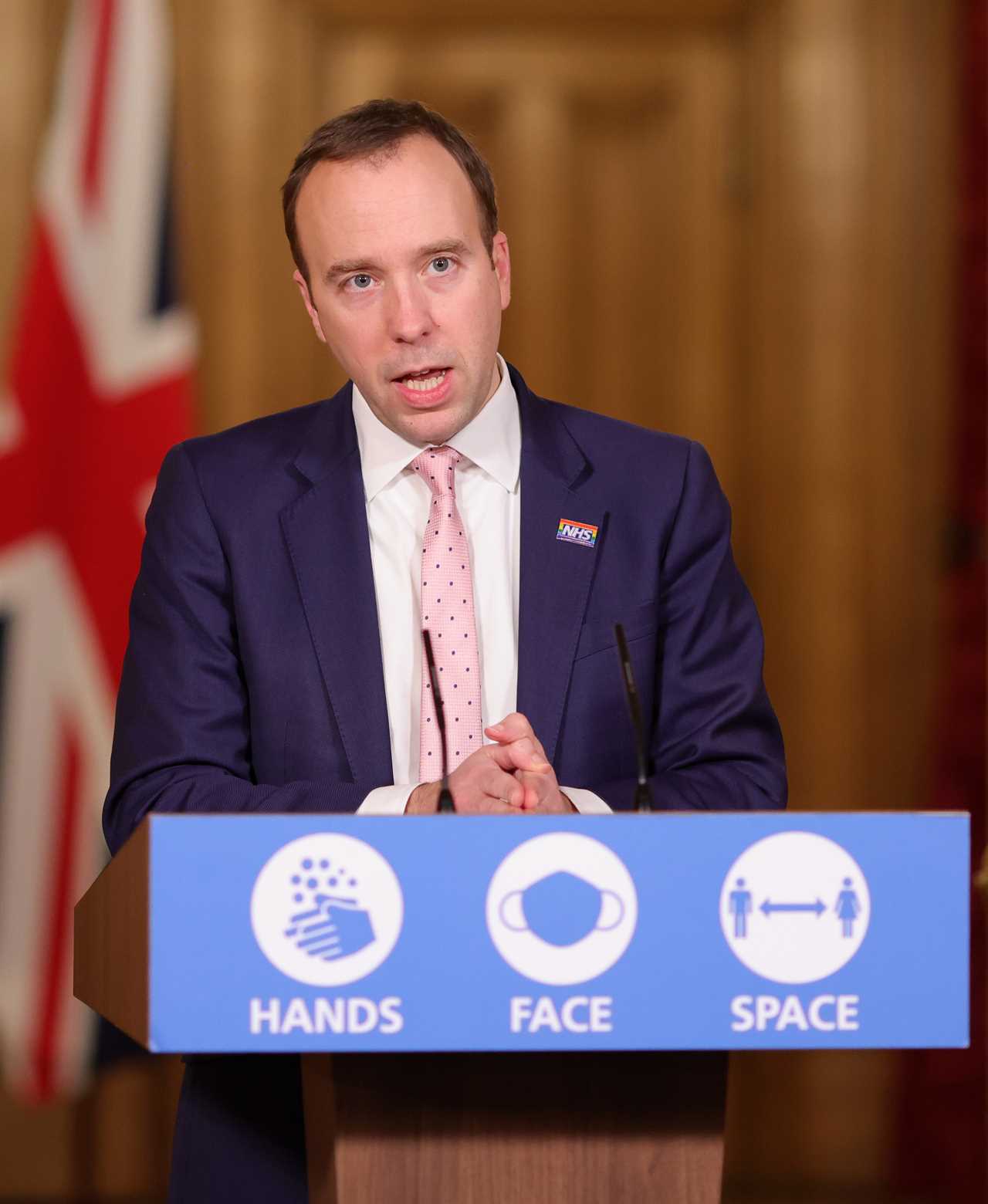
The two people in the UK thought to be contacts of those who travelled between the two countries in the last few weeks.
It comes as Britain battles a new variant called VUI2020/01, which is believed to have evolved in the UK.
Ministers were warned of the new UK variant last week, after scientists discovered its existence in late September.
This variant has reversed the UK’s progress in the fights against Covid, forcing the Government to impose restrictions similar to lockdown on 24 million people in the South and East of England.
What is the new strain from South Africa?
The new variant is called 501.V2 and it was announced by the South African government last Friday.
Lawrence Young, a professor of molecular oncology, Warwick Medical School, said: “The South African virus variant emerged in a major metropolitan area in South Africa following the first wave of the epidemic and then spread to multiple locations within two other neighbouring provinces.
“It has rapidly spread become the dominant virus variant in the Eastern and Western Cape provinces.”
At this stage, its symptoms do not appear to be different to that caused by the original Covid strain.
The most common signs of Covid to look out for are a loss of taste and smell, a persistent cough, and a high temperature.
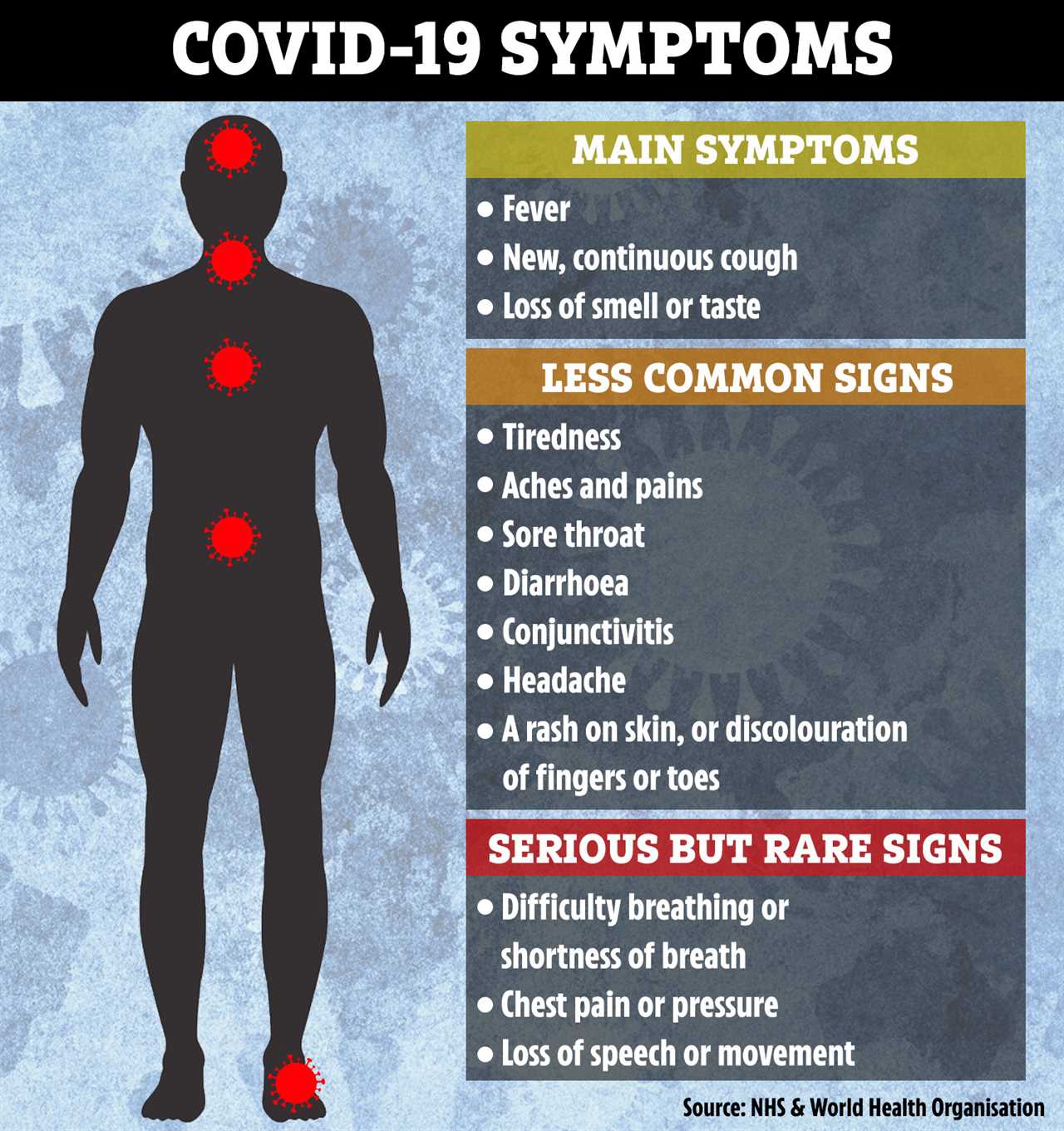
What is being done to stop it?
Mr Hancock has ordered anyone who has visited South Africa in the past two weeks, or been in contact with someone who has, to quarantine immediately.
He announced all flights from South Africa will be stopped, following the move from Germany, Switzerland, Turkey, Mauritius and Israel.
Mr Hancock said: “Anyone in the UK who has been in South Africa in the past fortnight and anyone who is a close contact of someone who has been in South Africa in the last fortnight, must quarantine immediately.
“They must restrict all contact with any other person whatsoever.”
He said the measures would be “temporary” while the new strain is investigated at Porton Down laboratories, run by Public Health England.
Dr Hopkins said health chiefs were “pretty confident” the measures that have been taken today will help to control the spread.
Dr Andrew Preston, a reader in microbial pathogenesis, University of Bath, said: “It is critical to act quickly to ring-fence a high-transmission infection to prevent it from becoming established, so the precautionary quarantine of those who may have come into contact with the South African variant is vital for this.”
Prof Young said it was “inevitable” more areas would move into the harsher levels of restrictions in light of the new variants.
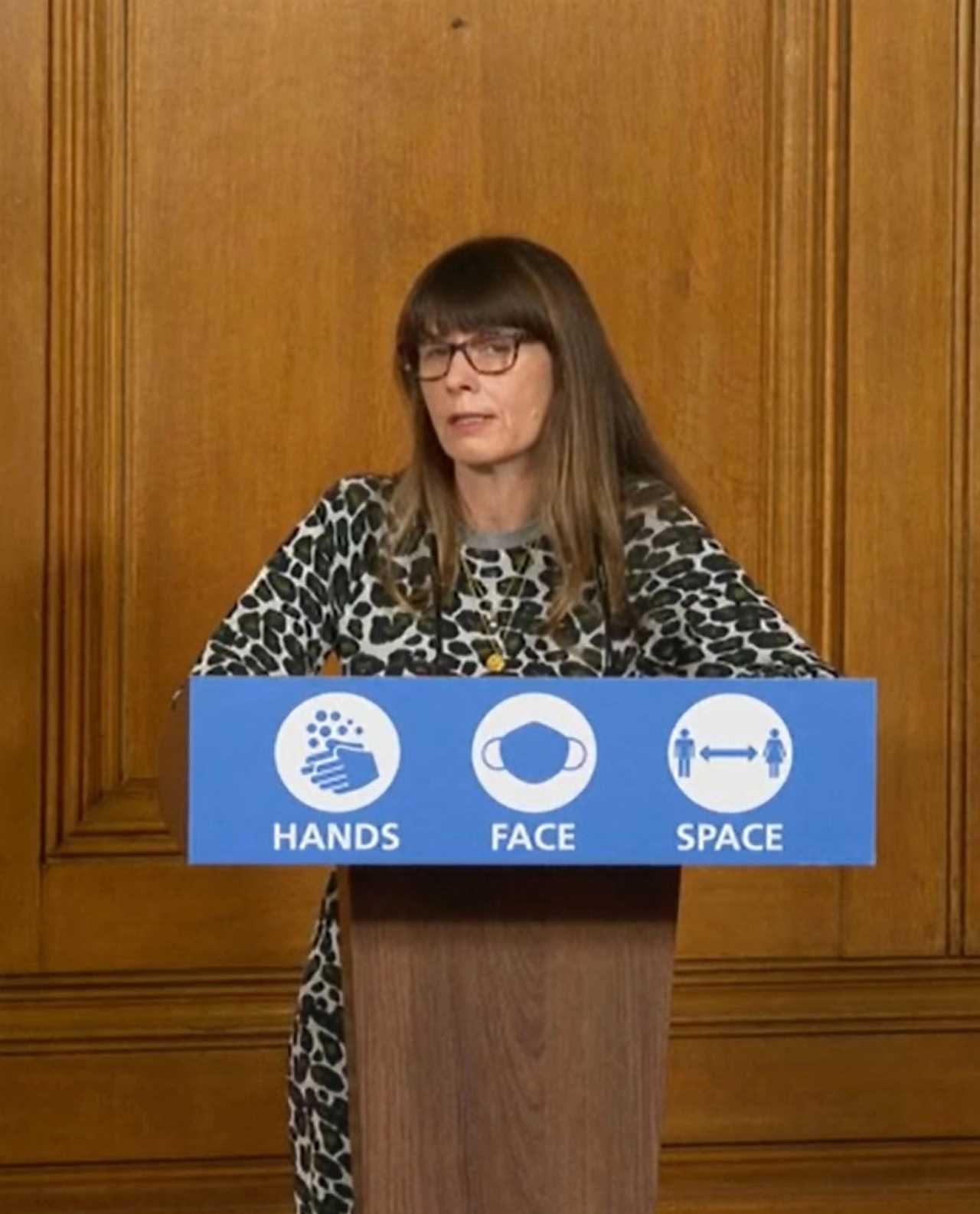
Already 43 per cent of the England population – all in the South East and East of England – will be in Tier 4 by Boxing Day morning.
Prof Young said: “It is essential that we do everything possible to prevent the South African variant from spreading to the UK population.
“Quarantine measures and restricting travel from and to South Africa are imperative.”
The same measures of social distancing, face mask wearing and hand washing will still help to prevent you catching any strain of the coronavirus.
Is it more dangerous?
The new strain appears to cause more severe disease in younger people.
That’s according to South African’s health minister Zweli Mkhize, who tweeted: “Clinicians have been providing anecdotal evidence of a shift in the clinical epidemiological picture- in particular noting that they are seeing a larger proportion of younger patients with no co-morbidities presenting with critical illness.”
The strain from South Africa appears to spread faster. Scientists are confident this is the case for the new UK strain, too.
This could be for a number of reasons – it may be because the mutations give it a biological advantage.
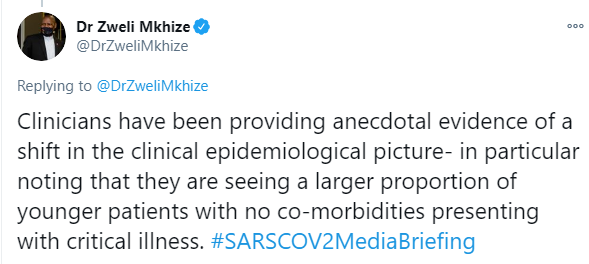
Or it could be because people who have it have a higher viral load, which makes them more infectious.
Infectious diseases expert Dr Susan Hopkins told the Downing Street press conference: “Both of them look like they are more transmissible. We have more evidence on the transmission for the UK variant because we’ve been studying that with great detail with academic partners.
On the vaccine, Dr Hopkins said : “We have no evidence at the moment that the vaccine will not work, actually what that means, in fact, is that there’s strong evidence that it will work because the vaccine produces a strong immune response and it’s broad and acts against lots of variation in the virus.
“What we are doing is laboratory studies with people who have had previous infection and who have had vaccine to look and see in the laboratory how their blood kills the virus.
“Those take a number of weeks as we grow the virus and do those studies. As soon as they are available, we will of course release them.”
How does it compare to the new UK strain?
The South African strain is “slightly different” to the UK’s one, according to Professor Neil Ferguson, a member of the UK GOvernment’s NERVTAG group, speaking to MPs today.
But at the Downing Street briefing, Dr Hopkins said the two variants were “very different”.
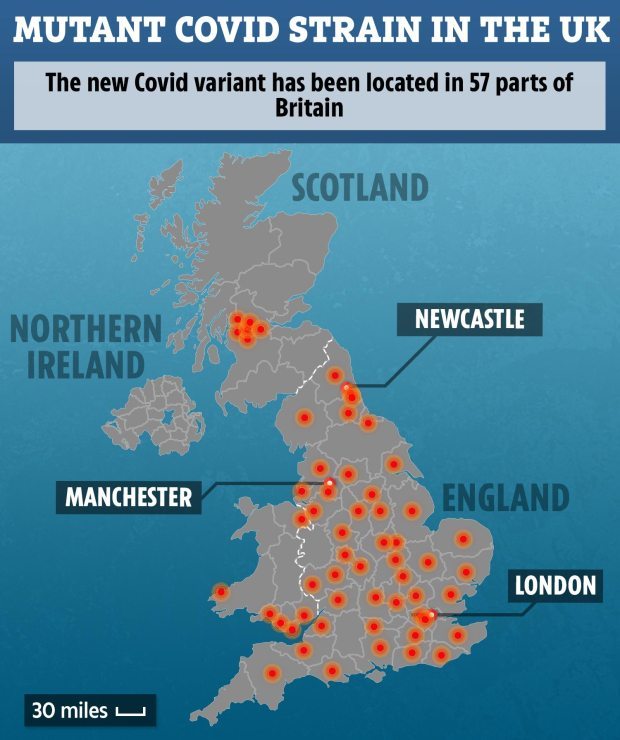
Dr Preston said: “The ’South African’ variant is distinct from the UK variant, but both contain an unusually high number of mutations compared to other SARS-CoV-2 lineages.”
A typical “new strain” might have a handful of mutations, but the British one has 17, while the South African variant has between 10 and 20.
“Some of these mutations change the S protein, which is cause for concern,” Dr Preston said.
The spike protein is on the outer surface of the viral particle. It is a focus for coronavirus vaccines, and so if it changes, it could affect how vaccines work.
Will it affect vaccines?
Since the emergence of the British strain, health officials and scientists have said it is “highly unlikely” this will render the vaccines useless.
This is probably the case for the South African one, too. But work is ongoing to look at this further and could take weeks.
It is possible that in the future, we will need to adjust our vaccines so they are perfect against the strains in circulation.
This is how the flu vaccine is made every year.
What’s happening in South Africa?
501.V2 accounts for up to 90 percent of South Africa’s new cases.
Daily confirmed infections are reaching 9,500 per day, on average.
It’s the highest it’s been since the peak of the first wave in July, when almost 13,000 cases were being diagnosed a day.
The country saw a dip in cases between September and mid-November before a sudden spike, which the health minister Mr Mkhize said was “being driven by this new variant”.
Latest figures suggest the South African strain was behind a record number of people being hospitalised there.
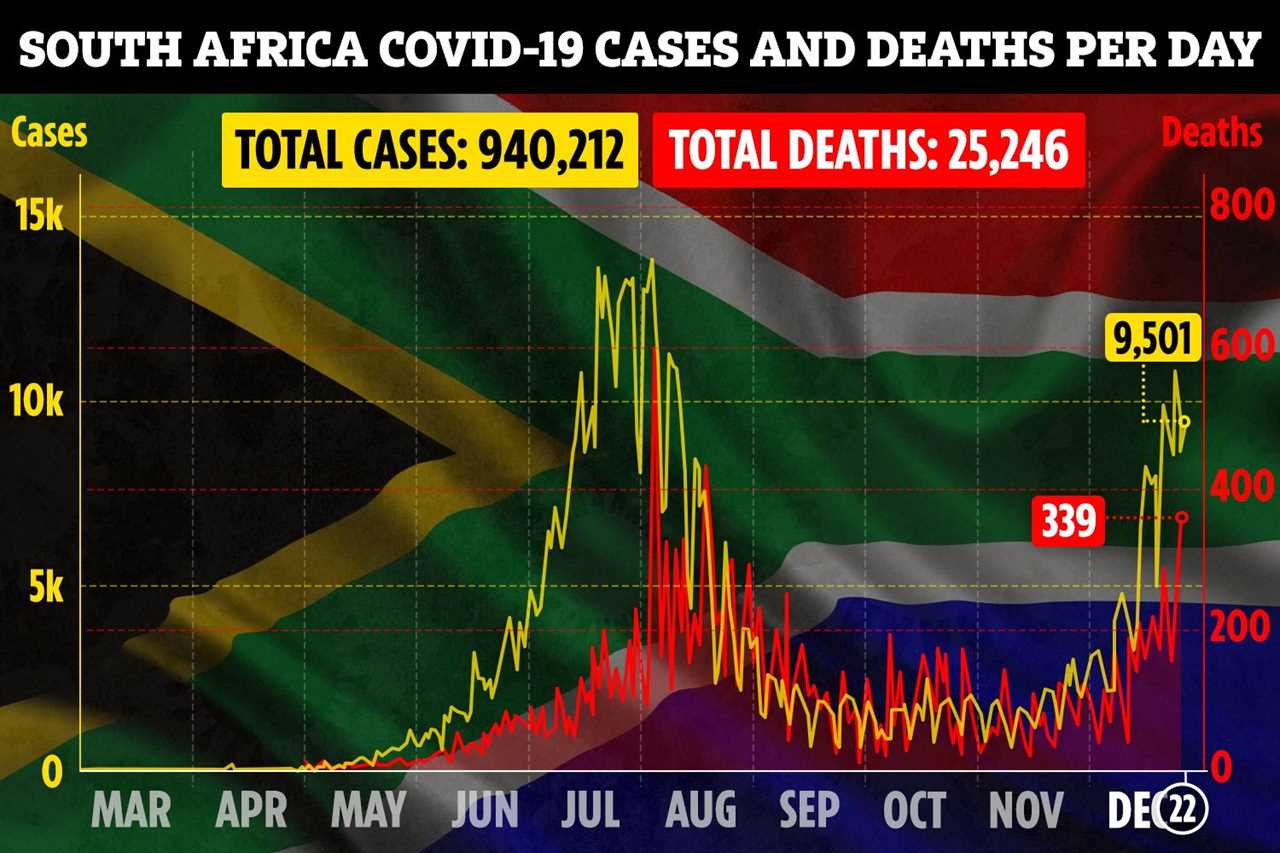
South Africa has recorded the highest number of coronavirus infections on the African continent, approaching the 950,000 mark, with over 25,000 related deaths so far.
A resurgence in positive cases saw the government tighten lockdown restrictions last week, but a lockdown has not been used.
The World Health Organization (WHO) said on December 18 it was in touch with the South African researchers who identified the new variant.
“We are working with them with our SARS-CoV-2 Virus evolution working group,” said WHO epidemiologist Maria Van Kerkhove.
“They are growing the virus in the country and they’re working with researchers to determine any changes in the behaviour of the virus itself in terms of transmission.”
Should we be worried?
Mutations are normal in any evolution of a virus over time. Already thousands have been found in SARS-CoV-2 within one year.
What makes the latest two from the UK and South Africa so interesting is the speed at which they became “prominent”, causing lots of cases and suddenly.
Prof Young said: “Variants of SARS-CoV-2 have been around since the beginning of the pandemic and are a product of the natural process by which viruses develop and adapt to their hosts as they replicate.
“Most of these mutations have no effect on the behaviour of the virus but very occasionally they can improve the ability of the virus to infect and/or become more resistant to the body’s immune response.”
Dr Anthony Fauci, director of the US National Institute of Allergy and Infectious Diseases, warned against overreacting to new coronavirus variants.
He told BBC Radio 4’s Today programme: “RNA viruses mutate, we know that, they continue to mutate – they have mutated in the past and they will mutate in the future.
“The mutations that have been noticed in the south-eastern part of the UK and in South Afric… I don’t think that this is something that would require draconian changes in policy so we have to be careful that we don’t overreact to something that is the natural evolution of the virus that might not have any strong impact on how we handle the virus in any way.”






